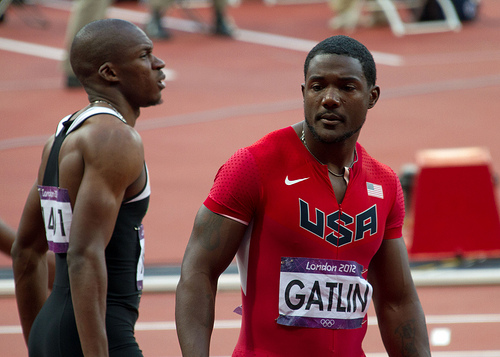With just two weeks before the World Championships in Beijing, Athletics is under extreme scrutiny once more.
With fresh allegations of doping emerging from German broadcaster ARD and the Sunday Times, Athletics is now in the situation that Cycling finds itself in, with the questioning of any athlete that puts in an exceptional performance. Will it ever emerge from the uncertainty?
The world of Athletics has always been dogged by doping. Since the fall of the Berlin wall led to the world finding out about the murky world of sport in East Germany, Athletics have taken more hits than a journeyman boxer.
The sport was rocked when Ben Johnson was found to have been cheating when he stormed to the 1988 100m final in Seoul. He set a world record time beating bitter rival Carl Lewis at the same time. 55 hours later he had tested positive for anabolic steroids.
A few years later, two former record holders, Tyson Gay and Asafa Powell would also be banned from running, as well as the fastest man in 2015, Justin Gatlin, leaving the credibility of 100m sprinting left in disarray. Thankfully Usain Bolt has never doped and it seems the allegations have proved that he hasn’t. If he was ever proven to have doped it probably have an either bigger effect than of Lance Armstrong having his Tour De France’s stripped from him.
But with these fresh allegations coming out how can the sport be taken seriously again. If the reports are to be believed, and it is worth bearing in mind that the IAAF calls them ‘sensationalist and confusing’, than it is will be very hard to believe when someone breaks a world record or storms to victory in the future.
The report states that in the Women’s 1500m final at the 2005 World Championships in Helsinki, the four Russians who out of nowhere stormed to the first three places and fifth place had highly abnormal blood results.
Tatyana Tomashora, who was the reigning World Champion and Silver Medallist in the 2004 Olympics, was the first to cross the line and yet her off-score was 129. The normal for a woman is 103 or below. The runner up, who was subsequently disqualified for pushing, Yuliya Chizhenko-Fomenko, had a score of 140. Olga Yegorova, who was pushed into the silver medal position, had a score of 124, while fifth placed Yelana Soboleva had a score of 136. Remarkably Yegorova had tested positive for EPO in 2001 but was let off with a technicality.
It should have set off alarm bells but instead it continued. It is believed that 146 World Championship and Olympic medals, between 2001 and 2012, were won by athletes with abnormal blood results.
But what can be done?
It is hard to say what can be done. Despite the greatness of the Olympics, athletics has revenue of just £40m, making them relatively small in terms of money. In the IAAF’s response, they highlight that many of these results came out before the introduction of the Biological Passports, the electronic record for professional athletes showing any tests they have taken. The fact they have only 10 employees overseeing testing also makes it difficult but they have pursued 63 cases and have punished 39 athletes.
Vice-President of the IAAF, Lord Coe, has also launched a staunch defence on the results and has described the allegations as a ‘declaration of war’ against the sport.
The sport is clearly in two different minds in their response to these allegations. Whilst the IAAF has vented anger, many athletes have come out and said it confirms what they already thought. They want this to be a beginning of change and for the IAAF to act now instead of showing fury of the results.
It would seem that this isn’t going to go away anytime time fast. With the world championships on their way and with Justin Gatlin the favourite, a win for a man who has served not one, but two drugs bans, isn’t what the sport really needs.
As we get closer to that final, the talk will begin again. Lord Coe has called for a properly resourced independent testing programme to clean up the sport. First he has to win the forthcoming IAAF president election against Sergey Bubka. With Bubka believing the IAAF should be showing more transparency, we have two men who want to clean up the sport.
Could it be as simple as more testing and longer more punishing bans? We will have to wait and see.



















